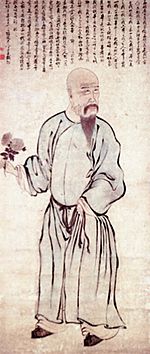Yuan Mei facts for kids
Quick facts for kids
Yuan Mei
|
|||||||
|---|---|---|---|---|---|---|---|
| 袁枚 | |||||||

Yuan Mei Portrait by Luo Ping
|
|||||||
| Born | March 25, 1716 |
||||||
| Died | January 3, 1798 (aged 81) | ||||||
| Education | jinshi degree | ||||||
| Occupation | Painter, poet | ||||||
|
Notable work
|
Suiyuan shihua Suiyuan Shidan |
||||||
| Relatives | Yuan Ji (sister) | ||||||
| Chinese name | |||||||
| Chinese | 袁枚 | ||||||
|
|||||||
| Zicai | |||||||
| Chinese | 子才 | ||||||
|
|||||||
| Jianzhai | |||||||
| Traditional Chinese | 簡齋 | ||||||
| Simplified Chinese | 简斋 | ||||||
|
|||||||
| Cangshan Jushi | |||||||
| Traditional Chinese | 倉山居士 | ||||||
| Simplified Chinese | 仓山居士 | ||||||
| Literal meaning | Mount Cang Householder | ||||||
|
|||||||
| Suiyuan Zhuren | |||||||
| Traditional Chinese | 隨園主人 | ||||||
| Simplified Chinese | 随园主人 | ||||||
| Literal meaning | Owner of Sui Garden | ||||||
|
|||||||
| Suiyuan Laoren | |||||||
| Traditional Chinese | 隨園老人 | ||||||
| Simplified Chinese | 随园老人 | ||||||
| Literal meaning | Old Man of Sui Garden | ||||||
|
|||||||
Yuan Mei (Chinese: 袁枚; pinyin: Yuán Méi; 1716–1797) was a famous Chinese painter and poet. He lived during the Qing Dynasty. People often mentioned him with another writer, Ji Yun. They called them "Nan Yuan Bei Ji," meaning "Yuan of the south and Ji of the north."
Contents
Who Was Yuan Mei?
Yuan Mei was born in 1716 in a place called Qiantang. This area is now part of Hangzhou in Zhejiang province, China. His family was educated, but they had not held high government jobs before.
Early Life and Career
Yuan Mei was very smart. He earned a special degree called jinshi when he was only 23 years old in 1739. This was a big achievement! After that, he was immediately given a job at the Hanlin Academy.
From 1742 to 1748, Yuan Mei worked as a local official. He served in four different areas within Jiangsu province. However, in 1748, he decided to leave his job. He moved back to his hometown. He wanted to focus on his writing and art instead.
A Life of Writing and Art
For many years, Yuan Mei created a lot of poetry, essays, and paintings. His works showed his interest in Chan Buddhism. He also explored supernatural stories. He was known for his clear and elegant writing style.
Yuan Mei believed that poetry should come from personal feelings. He also thought it should be technically perfect. His ideas about poetry are found in his book, the Suíyuán Shīhuà. Later in his life, people called him "Mister Suiyuan." This name came from his famous garden.
Travel and Teaching
Yuan Mei loved to travel. He explored many beautiful places in southern China. He visited famous mountains like Huangshan and Wuyi. He often wrote about his journeys in his journals.
He also taught students. Yuan Mei especially admired women's poetry. He took several female students and helped them publish their poems. This was unusual for his time.
Beliefs and Women's Education
Yuan Mei did not like the strict rules of his time. He believed in creativity and self-expression. He strongly supported women learning to read and write.
He was famous for his Sui Garden. Women would gather there to write and share their poetry. Yuan Mei's own sisters were also praised for their writing skills.
Fascinating Wonder Tales
Yuan Mei wrote a collection of supernatural stories. It was called the Zi buyu. This title means "What the Master does not Speak of." It was first published in 1788. Later, it was renamed Xin Qi xie, or "New wonder tales from Qi."
This book contained about 747 tales. It was followed by a second collection. These stories were like anecdotes. Yuan Mei said they were actual events he had recorded over many years.
Yuan Mei's Food Philosophy
Yuan Mei was also a famous food writer. Some people call him "China’s Brillat-Savarin." He is considered one of China's great food experts.
During his time, many people liked fancy and expensive meals. But Yuan Mei preferred simple, natural cooking. He wrote that long menus were "mere display, not gastronomy." He believed food should taste good naturally.
He once went to a fancy dinner. After, he went home and cooked simple congee because he was still hungry! He told cooks not to change the natural state of food. He thought it was wrong to shape bird's nest into balls. He also disliked how some Chinese food was changed by Manchu cooks. He felt that people were losing their own cooking traditions.
Yuan Mei shared his recipes and cooking ideas in his 1792 cookbook. It was called The Way of Eating.
See also
 In Spanish: Yuan Mei para niños
In Spanish: Yuan Mei para niños
 | Jewel Prestage |
 | Ella Baker |
 | Fannie Lou Hamer |

